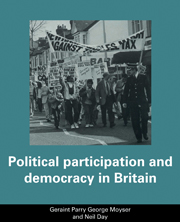Book contents
- Frontmatter
- Contents
- List of figures
- List of charts and maps
- List of tables
- Preface
- Part I Theories and methods
- Part II Patterns and pathways
- Part III Issues and actions
- Part IV The local process
- 14 The local political scene
- 15 Local participation
- 16 Local elites, activists and agendas
- 17 Participation and the making of the local agendas
- 18 The quality of local participation
- Part V Conclusions
- Appendix A Survey methods
- Appendix B Measuring elite-citizen concurrence
- Appendix C The National Questionnaire
- Endnotes
- Bibliography
- Index
18 - The quality of local participation
Published online by Cambridge University Press: 03 May 2011
- Frontmatter
- Contents
- List of figures
- List of charts and maps
- List of tables
- Preface
- Part I Theories and methods
- Part II Patterns and pathways
- Part III Issues and actions
- Part IV The local process
- 14 The local political scene
- 15 Local participation
- 16 Local elites, activists and agendas
- 17 Participation and the making of the local agendas
- 18 The quality of local participation
- Part V Conclusions
- Appendix A Survey methods
- Appendix B Measuring elite-citizen concurrence
- Appendix C The National Questionnaire
- Endnotes
- Bibliography
- Index
Summary
Although local government was for long regarded as a foundation stone of British democracy, it has come under increasing criticism for its alleged inefficiency and profligacy. Defenders of local government would argue that its proximity to its constituents should ensure that it is more sensitive to their needs and problems. At the same time, this proximity to the local population makes citizen participation more feasible. People are more able to contact their local representatives and officials, or even to take a more direct part themselves as councillors, and in doing so they will bring to their participation a greater depth of knowledge than they could to the ‘high politics’ of parliament and national government (for discussions see Sharpe 1970; Newton 1982). Nevertheless, in the 1980s, there was a steady reduction in the autonomy of local government. The Conservative governments limited local government spending in an effort to restrain public expenditure and restructured local taxing powers. By such measures as encouraging the sale of council houses to tenants and permitting parents to elect to remove schools from local authority control, the governments also removed certain spheres of responsibility from local government.
Relations between central and local government have thus been transformed. Yet, as has been seen throughout this book, the bulk of political participation has, as theories of democracy have often supposed or indeed hoped, been conducted at the local level.
- Type
- Chapter
- Information
- Political Participation and Democracy in Britain , pp. 389 - 412Publisher: Cambridge University PressPrint publication year: 1992



